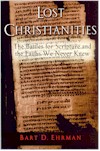 |
|
|
| ||||||
|
|
This page is the original source of this review, though you may also find it on Amazon or other sites. | ||
| Book Reviews Home | Free Audio Books | |
 |
Book Review of: Lost ChristianitiesWe highly recommend Lost Christianities:
The Battles for Scripture and the Faiths We Never Knew |
| Review
of Lost Christianities: The Battles for Scripture and the Faiths We
Never Knew, by Bart D. Ehrman Reviewer: Mark Lamendola The advice "Don't discuss politics or religion" usually makes good sense, because such discussions often pit one uninformed opinion against another - with a net negative result. What happens, however, when a person undertakes massive research to present an objective, respectful, scholarly view of a religious subject? One possible result is a captivating book that opens your mind and touches your heart. Bart Erhman achieved that result with this book. Ehrman discusses the various agendas of the authors behind both "scripture" and "heresy." He discusses how various writings supported the case for one faction of Christianity or another. He discusses what these writings were, how they came to be, how they were discovered after centuries of being lost, and how scholars have analyzed them. During all of this discussion, Ehrman doesn't push an agenda of his own. Indeed, he appears to explain the views and goals of each faction without taking the side of any of them. Consequently, the book moves the reader to a deeper, more informed, appreciation of Christianity. That appreciation creates a desire to replace divisive dogma with healing spirituality. The New Testament did not exist in early Christian times. It came about much later, and was a weapon in the battle for dominance among various factions. It served to unite many disparate churches into an orthodoxy. But, that orthodoxy necessarily negated the views of those whose "scriptures" weren’t included in the New Testament. The New Testament is a collection of writings that support a particular set of views of Christianity (Ehrman explains why this is both a good thing and a bad thing). Many of the canonized books are not what they are commonly purported to be. In fact, some of them are forgeries. At first glance, such a statement seems inflammatory. Perhaps that's why Ehrman takes the reader through the evidence - rather than making simple proclamations. Here's a tidbit to consider. You may not know that Timothy was considered for canonization, but then dropped - while Timothy was included though it was known to be a forgery. What about the other books of the New Testament? And what about the other books that didn't make it into the New Testament? Ehrman answers those questions in a manner that does not attack Christianity, but instead reframes it in the spirit of truth.
Many churches have split over differences in "following God's Word." Often, the underlying disagreements arise over interpretations of a passage in the New Testament. The "combatants for Christ" may mean well, but they both are most likely basing their differing interpretations on a forgery - rather than an Apostolic letter. As a result, we have many sects of Christianity rather than one true way. As varied as our flavors of Christianity are today, however, the variance was much greater in the early years of Christianity. Understanding this basic fact and understanding where our divisive doctrines came from will help anyone be a better member of the Christian family. For anyone who seeks to achieve such a goal, this book tills the soil and plants the seed. If you can do just a little watering and weeding, your faith will grow like a mustard seed. | |
About these reviewsYou may be wondering why the reviews here are any different from the hundreds of "reviews" posted online. Notice the quotation marks? I've been reviewing books for sites like Amazon for many years now, and it dismays me that Amazon found it necessary to post a minimum word count for reviews. It further dismays me that it's only 20 words. If that's all you have to say about a book, why bother? And why waste everyone else's time with such drivel? As a reader of such reviews, I feel like I am being told that I do not matter. The flippancy of people who write these terse "reviews" is insulting to the authors also, I would suspect. This sound bite blathering taking the place of any actual communication is increasingly a problem in our mindless, blog-posting Webosphere. Sadly, Google rewards such pointlessness as "content" so we just get more if this inanity. My reviews, contrary to current (non) standards, actually tell you about the book. I always got an "A" on a book review I did as a kid (that's how I remember it anyhow, and it's my story so I'm sticking to it). A book review contains certain elements and has a logical structure. It informs the reader about the book. A book review may also tell the reader whether the reviewer liked it, but revealing a reviewer's personal taste is not necessary for an informative book review. About your reviewer
About reading styleNo, I do not "speed read" through these. That said, I do read at a fast rate. But, in contrast to speed reading, I read everything when I read a book for review. Speed reading is a specialized type of reading that requires skipping text as you go. Using this technique, I've been able to consistently "max out" a speed reading machine at 2080 words per minute with 80% comprehension. This method is great if you are out to show how fast you can read. But I didn't use it in graduate school and I don't use it now. I think it takes the joy out of reading, and that pleasure is a big part of why I read. |
| |||||